Wanted: More Context, Better Informed Journalists
Robert Budd’s Newsstand Was Like No Other
MSNBC Claims Diversity Crown in Cable News
Donations are tax-deductible.

Wanted: More Context, Better Informed Journalists
“A new Pew Research Center report finds that 63% of Black Americans say news coverage about Black people is often more negative than news about other racial and ethnic groups,” the center reported Wednesday.
“While few are optimistic that will change in the foreseeable future, many see ways in which that coverage could be improved. And one factor consistently stands out – making sure that all journalists are informed about the issues affecting Black people.
“This multi-method report, which is based on a survey of 4,742 U.S. Black adults conducted from Feb. 22 to March 5, 2023, and nine online focus groups of Black Americans facilitated between July and August 2022, has additional findings about:
-
-
“Views of coverage: At least half of Black adults say the news they see or hear about Black people only covers certain segments of Black communities (57%) or is often missing important information (50%), substantially higher than the 9% each who say it covers a wide variety of Black people and often reports the full story. Just 14% of Black Americans say that it is extremely or very likely that Black people will be covered fairly in their lifetimes. Far more (38%) think this is not too or not at all likely to happen.
-
“Steps for improving coverage: A large majority of Black Americans say that when journalists cover Black people, it is extremely or very important for them to cover all sides of an issue (76%) and understand the history of the issues in a story (73%). Roughly half (48%) say the same of journalists advocating for Black people when covering them. Among those who say they at least sometimes see racist or racially insensitive coverage about Black people, almost two-thirds (64%) say educating all journalists about issues impacting Black Americans would be a highly effective way to make coverage fairer. Substantial shares say the same of including more Black people as sources (54%) and hiring more Black people as newsroom leaders (53%) and as journalists (44%).
-
“Newsroom representation: Many Black Americans see instances when it is important for the news they get to come from Black journalists – particularly in news related to race and racial inequality. For instance, 45% say that Black journalists do a better job than other journalists at covering issues related to race and racial inequality, and 44% say Black journalists are better at understanding them. But few think their news in general needs to come from Black journalists or that a journalist’s race is a key factor in the credibility of a news story. For instance, just 14% of Black Americans say it is highly important that any news they get, regardless of topic, comes from Black journalists.
-
“Concerns about coverage within the Black population: Concerns about how Black people are covered in the news are widespread across the Black population. For instance, Black Republicans and Black Democrats (including leaners) are largely in agreement in identifying problems in news coverage of Black people: 46% of Republicans and 44% of Democrats agree that coverage largely stereotypes Black people, with just 11% in each group saying it largely does not. Additionally, Black Americans with higher levels of education and income tend to be especially negative in their assessments of the media’s coverage of Black people.
-
“The role of Black identity: Black Americans differ widely in their views of and experiences with news based on their sense of their own Black identity. For instance, the vast majority of those who say being Black is highly important to how they think about themselves (82%) say it is extremely or very important for journalists to understand the history of the issues in the story when covering Black people. That number falls to 55% among those who say being Black is less important to their identity.
-
“Sources of news and information: At least a third of Black Americans say they get news extremely or fairly often from local news outlets, national news outlets, social media sites, and friends, family and acquaintances. About a quarter of Black Americans (24%) say they get news from Black news outlets extremely or fairly often, with another 40% saying they do so sometimes.
-
“The margin of sampling error for the full sample of 4,742 respondents is plus or minus 2.1 percentage points.”
- David Bauder, Associated Press: Black Americans express concerns about racist depictions in news media, lack of coverage efforts (Journal-isms quoted)
- Journal-isms: A Belated Apology for Notorious Crime Coverage (Sept. 5)
- Pew Research Center: Pew research on Black Americans
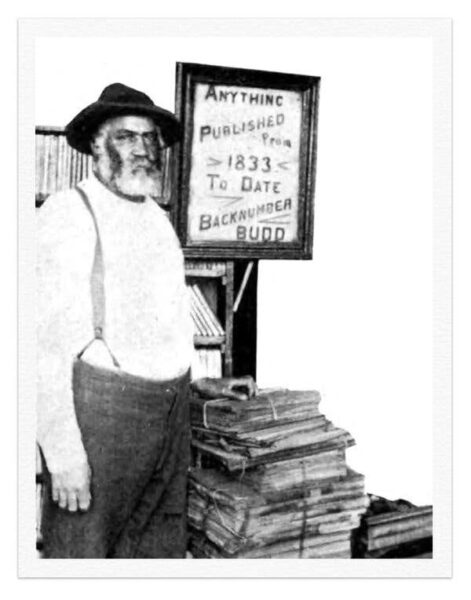
Robert Budd’s Newsstand Was Like No Other
“It was the height of the Civil War, and a young Robert M. Budd was hitching a ride from a Union Army encampment in Northern Virginia to his home in Washington, D.C. Boarding a wagon, he found that it was carrying federal soldiers — some wounded, others dead,” Ellen Gruber Garvey reported Aug. 20, updated Aug. 23, for The New York Times.
The report is part of the Times’ “Overlooked,” “a series of obituaries about remarkable people whose deaths, beginning in 1851, went unreported in The Times.”
The story continued, “Robert was brave. Not only was he risking getting shot in a theater of war, but, because he was Black, he was also in danger of being kidnapped and enslaved. But he had accepted those risks to earn some money: selling newspapers to the troops as a newsboy.
“Some soldiers, he found, were willing to pay more for older issues carrying stories about battles they had fought in — $3, for example, for a paper that carried reports of the second Battle of Bull Run, in August 1862, rather than the typical price of three cents.
“And with that discovery, a business idea was born.
“Later moving to New York, Budd, in the early 1880s, opened a newsstand in Manhattan, where for a time he was recognized as the sole purveyor of old newspapers and magazines, also called back numbers. The New York Sun in 1895 described him as ‘the only man in America in the back number newspaper business’ (though some book stores also had a few old papers on hand).
“Stairs next to his newsstand, in Greeley Square, led to a tunnellike gaslit basement, which, as The Brooklyn Daily Eagle wrote, Budd filled with ‘the world’s largest collection of old newspapers’ as well as magazines, sensational dime novels and theater programs. Budd became known as the Back Number King or, more often, Back Number Budd, which was how he signed his checks.
“He built his collection by buying papers from clubs, hotels and elsewhere at the per-pound rate that dealers usually offered to pulp them. By the end of the 1880s, the collection had grown to more than 2 million copies, requiring, he found, a warehouse to store them. With the proceeds from his now-thriving business, he bought one in Queens. There his inventory continued to swell — to more than four million copies in the 1890s and to more than six million copies by about 1905. . . .
“Budd’s collection may have been more inclusive than any database that exists today . . . Some of the titles listed in his directory cannot be found in digitized or paper form. . . .”
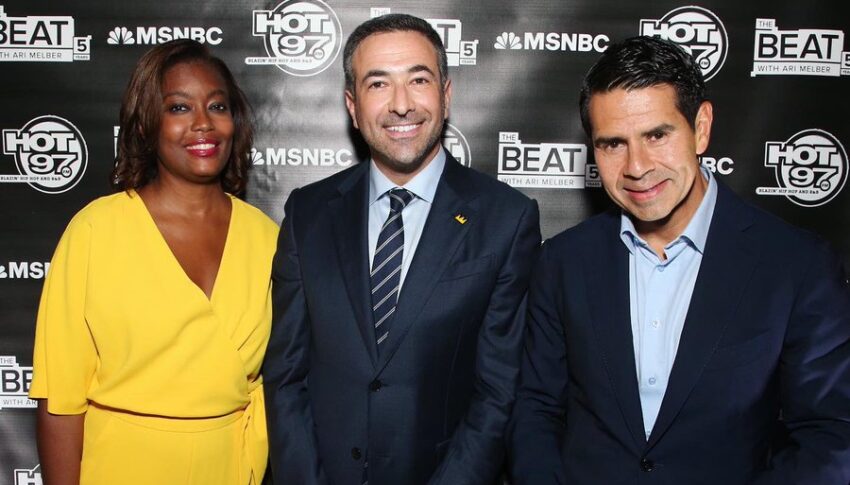
MSNBC Claims Diversity Crown in Cable News
MSNBC declared Tuesday that its programming “attracts the most diverse cable audience in America.”
Moreover, a spokesperson confirmed, “MSNBC had more Black viewers than BET or TV One” in the third quarter of 2023.
“MSNBC maintained its lead as the #1 cable network among Black viewers for the 2nd straight quarter, and also ranked #1 in all of cable among Hispanic and Asian viewers,” the network said in a news release.
“Among cable news networks, [the third quarter of 2Q23] marked MSNBC’s 11th straight quarterly win among Black viewers and 2nd straight win among Hispanic and Asian viewers.
“Excluding sports programming, MSNBC’s ‘The Beat with Ari Melber’ and ‘Deadline: White House’ ranked #1 and #2 respectively among Hispanic viewers [Univision and Telemundo are broadcast, not cable networks], while ‘The Beat’ and ‘The ReidOut’ ranked #1 and #2 among Asian viewers. MSNBC is also home to the 10 highest-rated cable news programs among Black Americans.
“Across all of cable, MSNBC had 10 of the Top 20 programs among Black viewers in 3Q23 [the third quarter]: ‘The ReidOut,’ ‘The Beat with Ari Melber,’ ‘Deadline: White House,’ ‘The Last Word with Lawrence O’Donnell,’ ‘The Rachel Maddow Show’ ‘All In with Chris Hayes,’ ‘Morning Joe [Scarborough],’ ‘PoliticsNation with Rev. [Al] Sharpton,’ ‘Alex Wagner Tonight,’ and ‘The 11th Hour with Stephanie Ruhle.’ Additionally, ‘PoliticsNation with Rev. Sharpton continues to have the highest concentration of Black viewers (42%) of any program on cable news. . . .”
The network also said, “For the 3rd quarter of 2023, MSNBC beat CNN in the key Adults 25-54 [demographic] during total day viewership (M-Su 6am-6am), notching the network’s 2nd consecutive quarterly win and best quarterly ratings since 2021, according to Nielsen ratings data. Among total viewers, MSNBC was the #2 cable network, sweeping CNN in total day (M-Su 6am-6am; 11th straight quarter), mornings (M-F 6am-10am; 33rd straight quarter), dayside (M-F 10am-4pm; 6th straight quarter), prime (M-Su 8pm-11pm; 27 straight quarters), and weekends (Sa-Su 6am-6am; 2nd straight quarter).”
The Racist Origins of Government Shutdowns
Sept. 25, 2023
Ex-Rebels in Congress Wanted Blacks Unprotected
J-Grant Donors Call Diversity a ‘Core Value’
Despite Allegations, Kendi Denies Mismanagement
Most Latinos Want Descendants to Speak Spanish
20% of Asian American Adults Hide Part of Heritage
‘Relentless Culture Wars’ Among Murdoch’s Legacy
N-Word Once Was Routine in Times-Picayune
Rod Beard Promoted to Detroit News Sports Editor
Congolese Leader Insists He Supports the Media
Short Takes: Kevin Powell and 50 years of hip-hop; Alicia Menendez, Sen. Bob Menendez and MSNBC; Atlanta Journal-Constitution; Adam Orduna; fast-growing ethnic groups in U.S.; Lil Kim and Ebony; Joshua Eure; students report from Civil Rights Trail; Whitney Maddox; Mumia Abu-Jamal; Chioma Nnadi and British Vogue; Afghan refugees’ monthly newspaper; preserving and archiving Nigerian newspapers; all-female newsroom in Somalia; Google and indigenous journalism in New Zealand; African carriers of Kremlin propaganda; sentencing the chair of the Hong Kong Journalists Association.
Support Journal-ismsDonations are tax-deductible.
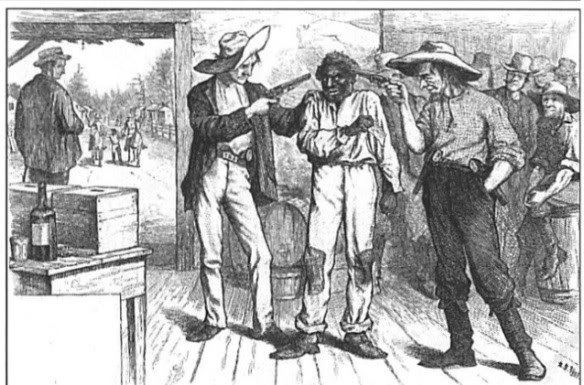
Ex-Rebels in Congress Wanted Blacks Unprotected
With a potential government shutdown now less than a week away, and hard-right Republican House members refusing to fund the federal government unless their demands for spending cuts are met, a brief mention on the “PBS NewsHour” last week reminded viewers that the shutdown threat — like the filibuster — has racist origins.
“The first government shutdown in history was in 1879, when former Confederate Democrats in Congress refused to fund the government unless protections for black voters went away,” NPR told us in 2019.
Carl Hulse and Annie Karni reported Sunday for The New York Times, “Both the president and the transportation secretary, Pete Buttigieg, made public calls for Republicans to resolve their differences before next Sunday, when federal funding is set to lapse. They noted that a shutdown would mean that members of the military would go without paychecks, air travelers could experience disruptions and a variety of programs safeguarding the public would be shuttered. Yet even after a weekend of private haggling at the Capitol, there was no sign that the G.O.P. was moving toward a resolution.”
In 1879, which was during Reconstruction or nearing its end, depending on the account, Republicans were the “party of Lincoln,” and the Democrats that of white supremacists.
Background: “In the spring of 1879, thousands of colored people, unable longer to endure the intolerable hardships, injustice, and suffering inflicted upon them by a class of Democrats in the South, had, in utter despair, fled panic-stricken from their homes and sought protection among strangers in a strange land,” reads an 1880 minority report from a Senate committee investigating the causes of mass Black migration from the South.
“Homeless, penniless, and in rags, these poor people were thronging the wharves of Saint Louis, crowding the steamers on the Mississippi River, and in pitiable destitution throwing themselves upon the charity of Kansas.
“Thousands more were congregating along the banks of the Mississippi River, hailing the passing steamers, and imploring them for a passage to the land of freedom, where the rights of citizens are respected and honest toil rewarded by honest compensation. The newspapers were filled with accounts of their destitution, and the very air was burdened with the cry of distress from a class of American citizens flying from persecutions which they could no longer endure.”
The NPR conversation focused on what was happening then in Congress. The exchange took place between host Ari Shapiro and Sarah Gonzalez of the “Planet Money” podcast.
“ARI SHAPIRO:
“This current federal government shutdown is the longest one we’ve had. Sarah Gonzalez of our Planet Money podcast tells us that the first time this sort of thing happened was over protections for black voters.
“SARAH GONZALEZ: In 1879, Rutherford B. Hayes was president, a Republican. He won after some controversial postelection negotiations.
“HEATHER COX RICHARDSON: A lot of people already are calling him Rutherfraud B. Hayes because he’s been elected by fraud.
“GONZALEZ: Heather Cox Richardson is a professor of American history at Boston College. . . .
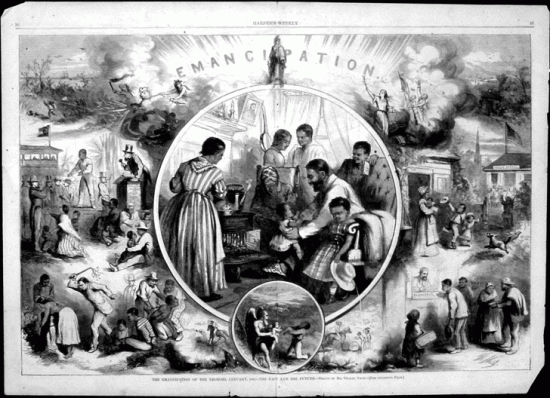
“GONZALEZ: Did they call it a shutdown?
“RICHARDSON: No, they called it the rider fight or the appropriations fight.
“GONZALEZ: A rider is a provision that gets tacked on to an appropriations bill. Now, to understand the very first shutdown, we have to go back to the Civil War. In 1861, almost all of the Southerners who were in Congress surrender their seats to go fight in the war as Confederates. But they slowly start gaining their seats back after they lose the war.
“RICHARDSON: These guys have literally been shooting at the same people that they’re going to be sitting with in Congress.
“GONZALEZ: At the time, African-American men were allowed to vote, but they tended to vote Republican. So Democrats didn’t want them voting. Sometimes, it resulted in violence at the polls. And the government would send troops. Nineteenth-century Democrats hated this. So when they gained control of Congress 14 years after the Civil War, they come up with this idea.
“RICHARDSON: Simply starve the government until they did what we wanted by holding a gun to the head of the Treasury.
“GONZALEZ: Fund the courts and the Army but only if the government stops protecting black voters.
“RICHARDSON: There are a number of cartoons in the newspapers about how the Confederates have taken back over Washington and how they are deliberately starving the United States Treasury the same way that they starved Union prisoners.
“GONZALEZ: And one guy in particular was telling the president, you cannot cave to the Democrats — James A. Garfield with the icy-blue eyes. He was the House minority leader.
“RICHARDSON: Hayes and Garfield look at what they’re doing, and they say, this is a complete perversion of the way the American government is supposed to work. A faction cannot starve the United States government to death to get its way. Once you have admitted that as [a] legitimate tactic of governance, you’ve destroyed our American Constitution.
“GONZALEZ: For months, Hayes vetoes bills that forbid protecting voters. And Democrats eventually give in on all but one very small part of the courts. It was mostly symbolic. But starving the government, shutting it down was considered so unsuccessful that no one tries it again for almost a hundred years.
“RICHARDSON: People recognized that you could not govern by extremism. There was a premium on abiding by our constitutional norms and by working things out between the different parties that wanted different things.
“GONZALEZ: There are a few small shutdowns in the 1970s and ’80s. But the return of shutdowns as a tactic really takes hold in the 1990s. Eventually, it did become so difficult for African-Americans to even register to vote. But it didn’t happen because of a shutdown.”
An addendum, from the Garfield Library: “Meanwhile, African-Americans, whose political status was at the center of the 1879 controversy, steadily lost ground in their fight for respect and civil rights, another legacy of the divisive politics of the Hayes/Garfield era.”
- Hayes Brown, MSNBC: Mitch McConnell is right about government shutdowns; When the federal government shuts down, nobody really wins — and Republicans tend to lose.
- Andrew Glass, Politico: Post-Reconstruction fight in Congress, March 18, 1879 (March 18, 2015)
- C. W. Goodyear, the Atlantic: How America Can Avoid the Next Debt-Ceiling Showdown: Lessons from 1879, when the U.S. government almost shut down but didn’t
- National Park Service: The 1879 “Government Shutdown,” Part I
- National Park Service: The 1879 “Government Shutdown,” Part II
J-Grant Donors Call Diversity a ‘Core Value’
A coalition of journalism organizations is urging the 22 donors planning to support local news with more than a half-billion dollars to keep in mind that “Racial and ethnic diversity, equity and belonging must be among the pillars of [the project’s] foundation.”
The donors told Journal-isms they agree.
![]() Signing the “open letter’ to the donors, who have aligned as Press Forward, were representatives of the Asian American Journalists Association; Indigenous Journalists Association, National Association of Black Journalists, National Association of Hispanic Journalists, Maynard Institute, Online News Association and OpenNews.
Signing the “open letter’ to the donors, who have aligned as Press Forward, were representatives of the Asian American Journalists Association; Indigenous Journalists Association, National Association of Black Journalists, National Association of Hispanic Journalists, Maynard Institute, Online News Association and OpenNews.
“Consider as a foundational criteria for all newsrooms that their organizations, including leadership, are reflective of the communities they serve.
“Break the cycle of disinvestment and the disproportionate investment in white leaders and organizations with under-representation of people of color.”
Ambar Mentor-Truppa, director of communications for the MacArthur Foundation, a lead donor, told Journal-isms on Friday, “Diversity in its many forms is a core MacArthur value and that is strongly expressed in our Journalism and Media Program.
“We are confident that our Press Forward partners share these commitments. Centering the needs of communities and ensuring equity and access are central tenets of Press Forward’s values. As we continue to listen to voices in the field, we are grateful for opportunities to restate our commitment to closing longstanding inequities in journalism practice and coverage.”
- American Press Institute: 17 news organizations receive support from the American Press Institute Civic Discourse and Community Voices Fund
- Corporation for Public Broadcasting: CPB Invests $2.25 Million in State Government Coverage
- Editorial, Washington Post: Even $500 million isn’t enough to save local journalism
- Mike Janssen, Current: New position paper argues for including public media in upcoming wave of foundation support
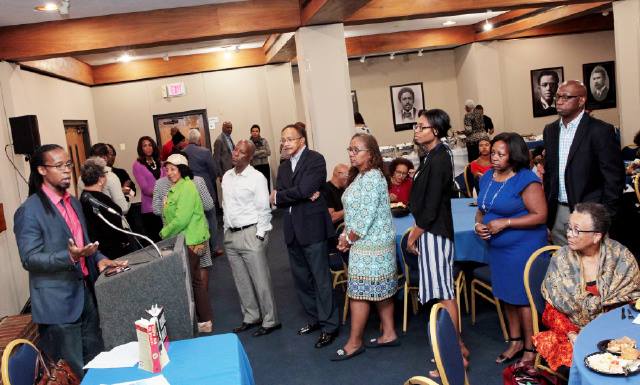
Despite Allegations, Kendi Denies Mismanagement
“One week after laying off more than half the staff of his Center for Antiracist Research, Ibram X. Kendi disputed allegations of mismanagement from former employees and said the center, which has raised tens of millions of dollars, is not in financial distress,” Hilary Burns and Mike Damiano reported Thursday for the Boston Globe.
“The layoffs, he said in an interview with the Globe, represent a strategic shift from operating as ‘a high-growth startup’ pursuing many different projects across a range of fields to becoming ‘the world’s first residential fellowship program for antiracist intellectuals.’ The fellowship model, he said, would be less costly to operate, so the funding for the center will last longer.
Burns and Damiano reported Wednesday that Boston University, which houses the Center for Antiracist Research, said it would conduct an “inquiry” into the center after complaints emerged about its culture and financial management.
“At the time, Kendi, the author of the bestselling 2019 book ‘How to Be an Antiracist,’ said the center would ‘solve these intractable racial problems of our time.’
“The money was meant to finance a range of ambitious projects: a database to track racial disparities nationwide, a graduate degree program, a media enterprise, and research teams studying the effects of systemic racism on health and society.
“Some of these projects have come to fruition, including The Emancipator, a digital publication launched with the Boston Globe’s opinion staff in 2021. The publication’s operations shifted to BU in March, although it continues to be hosted on the Globe’s website.
But others have not, including the Racial Data Tracker, which one former staffer described as a ‘centerpiece’ of the organization’s goals.”
University spokesperson Rachel Lapal Cavallario “said Wednesday that the center ‘has been developing’ the Racial Data Tracker. She referred follow-up questions to the center itself, which did not respond.
“She also provided a list of the center’s achievements, including: funding for numerous research projects, collaboration in a project launched by journalists at the Atlantic magazine (where Kendi is a contributing writer) to track racial disparities in COVID data, and organizing two ‘policy convenings’ on antibigotry and data collection related to race and ethnicity. . . .”
- Phillipe Copeland, Daily Beast: What I Saw While Working at Ibram Kendi’s Center for Antiracist Research at Boston University
- Molly Farrar and Lydia Evans, Daily Free Press, Boston University: Amid mass layoffs, BU Center for Antiracist Research accused of mismanagement of funds, disorganization
- Stephanie Saul, New York Times: An Ambitious Antiracism Center Scales Back Amid Allegations of Poor Management

Most Latinos Want Descendants to Speak Spanish
“Most U.S. Latinos speak Spanish: 75% say they are able to carry on a conversation in Spanish pretty well or very well. And most Latinos (85%) say it is at least somewhat important for future generations of Latinos in the United States to speak Spanish,” Lauren Mora and Mark Hugo Lopez reported Wednesday for the Pew Research Center.
“But not all Hispanics are Spanish speakers, and about half (54%) of non-Spanish-speaking Hispanics have been shamed by other Hispanics for not speaking Spanish.
“At the same time, 78% of U.S. Hispanics say it is not necessary to speak Spanish in order to be considered Hispanic.
“We asked U.S. Latinos about their views, attitudes and experiences with the Spanish language. Here is what we found.
“Key findings:
- “While most U.S. Latinos speak Spanish, not all do. . . .
- “About half of U.S. Hispanics who do not speak Spanish have been shamed because of it. . . .
- “Some Hispanics make jokes about those who do not speak Spanish. . . .
- “Spanglish use is widespread among U.S. Hispanics. . . .
- “Personal Hispanic identity is related to views about Spanish. . . .”
- Edwin Flores and Maya Brown, NBC News: The ‘no sabo kids’ are pushing back on Spanish-language shaming
- Rebecca Plevin and Melissa Montalvo, Fresno Bee/Better News: 4 ways The Fresno Bee and ‘La Abeja’ serve and engage with Latino audiences
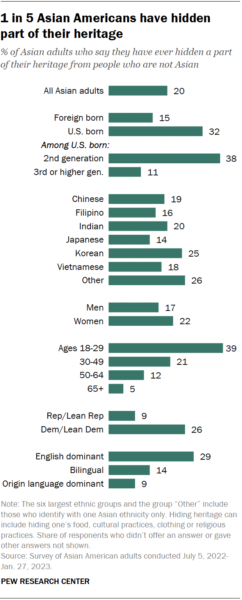
20% of Asian American Adults Hide Part of Heritage
“One-in-five Asian American adults say they have hidden a part of their heritage – cultural customs, food, clothing or religious practices – from non-Asians at some point in their lives,” Rachel Chen, Sono Shah and Neil G. Ruiz reported Sept. 11 for the Pew Research Center.
“Fear of ridicule and a desire to fit in are common reasons they give for doing this, according to a Pew Research Center survey of Asian adults in the United States conducted from July 2022 to January 2023.
“Birthplace and immigrant roots play a role in who is most likely to hide their heritage: 32% of U.S.-born Asian adults have done this, compared with 15% of immigrants. Among those born in the U.S., second-generation Asian adults (in other words, those with at least one immigrant parent) are more likely than third- or higher-generation Asian Americans (those with U.S.-born parents) to have hidden their culture from non-Asians (38% vs. 11%).
“Second-generation Asian Americans make up 34% of the U.S. Asian population, at approximately 7.9 million people, according to a Center analysis of the 2022 Current Population Survey. The majority of this group (66%) is under age 30. And according to our survey, they also primarily speak English.
“Aside from generational differences, here are other survey findings about who is most likely to have hidden their heritage from non-Asians:
- “Korean Americans are more likely than some other Asian origin groups to say they have hidden part of their heritage. . . .
- “Asian Americans ages 18 to 29 are about twice as likely as older Asian adults to have hidden their culture. . . .
- “Asian adults who are Democrats or lean Democratic are much more likely than those who identify with or lean toward the Republican Party to have hidden their identity.
- “Asian Americans who primarily speak English are more likely than those who primarily speak the language of their Asian origin country to have hidden part of their heritage. . . .”

‘Relentless Culture Wars’ Among Murdoch’s Legacy
“CNN host Abby Phillip tore into Rupert Murdoch and ‘the mess left behind,’ describing the legacy of the 92-year-old Australian billionaire who announced Thursday that he is ending his run as chairman of Fox News’ parent company, Fox Corporation, as ‘outrage porn, partisan red meat, stoking relentless culture wars,’” William Vaillancourt reported Friday for the Daily Beast.
“What followed was a six-minute compilation of cringey video clips of current and former Fox hosts like Tucker Carlson, Sean Hannity, Bill O’Reilly, and Brian Kilmeade spouting off about a variety of topics. In one Fox & Friends clip from 2010, for instance, Kilmeade says, ‘Not all Muslims are terrorists, but all terrorists are Muslims.’
“The montage also includes several instances of bogus election-related conspiracies being floated on the network after the 2020 presidential election — comments for which Fox paid dearly, as the network ended up shelling out $787.5 million to settle a lawsuit brought by Dominion Voting Systems earlier this year.
“ ‘That is Fox News—25 years of it,’ Phillip summarized. . . .”
On the “PBS NewsHour” Thursday, NPR media correspondent David Folkenflik, author of “Murdoch’s World: The Last of the Old Media Empires,” was asked, “Do you think anything is going to change then about the approach, the tone, the political slant of particularly FOX News and the other FOX News outlets, newspapers?”
Folkenflik told Journal-isms earlier this year, “I think that racially inflammatory and even racist rhetoric has been part of the company’s DNA going back to [Rupert Murdoch’s] British tabloids. Needless to say this is not true of everyone, every title or every program. Many Fox and Murdoch journalists are appalled by such things. But it is a notable and consistent feature.
“When things get extreme enough, rebukes are handed out. Sometimes. And then we find ourselves right back in it.”
- Clay Bennett, Chattanooga Times Free Press: Passing the torch (cartoon)
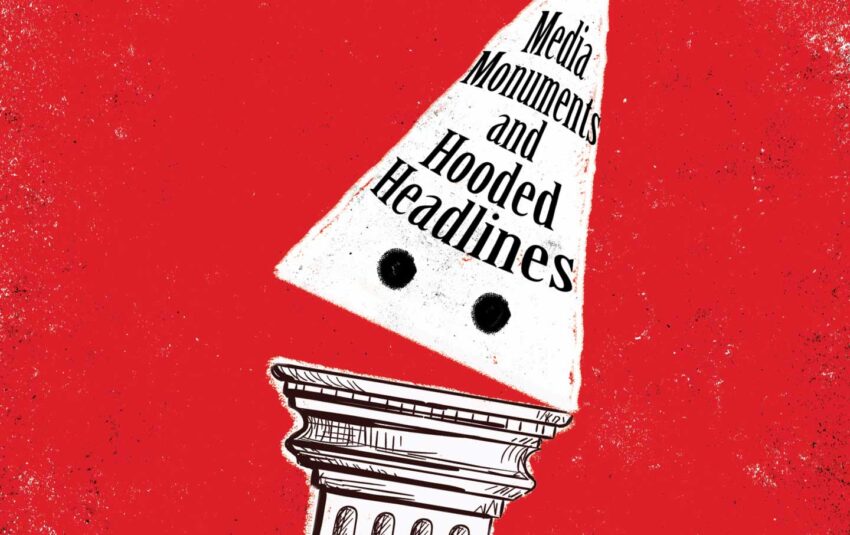
A graphic in The Nation illustrates the 2021 article, “American Journalism’s Role in Promoting Racist Terror.”
N-Word Once Was Routine in Times-Picayune
“The News Orleans daily newspaper the Times-Picayune, since its founding on January 25, 1837, and throughout 1914, when it merged with the Times-Democrat, regularly referred to African Americans as nigg*rs,” Bala Baptiste, chair of communications at Miles College, wrote Sept. 8 for the African American Intellectual History Society.
“As a result, the newspaper’s journalists demeaned, insulted, and trivialized the existence of Black people in their news and commentary. In the process, the Picayune reinforced supposed notions of Black ‘inferiority’ and white supremacy. The white editorial staff attempted to reduce African Americans to a perverted caricature that white people need not take seriously.”
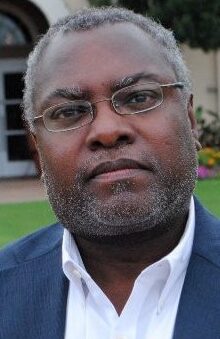 In one of several examples, some articles using the word in reporting on atrocities, Baptiste (pictured) wrote, “on May 6, 1911, a Picayune editor inserted the racial slur in a subhead of a long news story concerning a campaign speech by Mississippi Governor James K. Vardaman, who sought a seat in the U.S. Senate. The subhead read: ‘As to the “Nigg*r Question” and the Fifteenth Amendment.’ “
In one of several examples, some articles using the word in reporting on atrocities, Baptiste (pictured) wrote, “on May 6, 1911, a Picayune editor inserted the racial slur in a subhead of a long news story concerning a campaign speech by Mississippi Governor James K. Vardaman, who sought a seat in the U.S. Senate. The subhead read: ‘As to the “Nigg*r Question” and the Fifteenth Amendment.’ “
Baptiste concluded, “an overview of this abbreviated study, the Picayune casually published stories historically that callously referred to Black people as ‘nigg*rs.’ The news organization’s leaders apparently believed that Black people were ‘inferior.’ The use of the term ‘nigg*r’ suggested that the referent should not be taken seriously. If the Picayune generalized ‘nigg*r’ to all Black people, an explanation exists of why it waited 133 years from its founding in 1837 until 1970 before it hired its first Black journalist. Nevertheless, further study is needed to explain whether relationships existed between white exclusivity in the newsroom and the portrayal of Black people as ‘nigg*rs.’ ”
Rene Sanchez returned home to New Orleans last year to become editor of the Times-Picayune after nearly a decade as editor of the Star Tribune in Minneapolis. Asked to comment on Baptiste’s finding, he told Journal-isms, “That practice was horrible, so pernicious, so dehumanizing. And it reminds us more than a century later why a racially diverse newsroom is so essential, given the unique power of the press.”
- Jarvis DeBerry, New Orleans Times-Picayune: ‘Keeping a hateful word in the dictionary,’ Jarvis DeBerry’s first column (June 30, 2018, updated June 29, 2020)
- Channing Gerard Joseph, the Nation: American Journalism’s Role in Promoting Racist Terror (April 19, 2021)
- Journal-isms: Extra, Extra! Get Your Daily Jim Crow! (Dec. 14, 2021)
- University of Maryland: UMD Howard Center Begins Publishing ‘Printing Hate’ Project on Historic Role of Newspapers in Fueling Racial Hate, Violence (Oct. 18, 2021)
Rod Beard Promoted to Detroit News Sports Editor
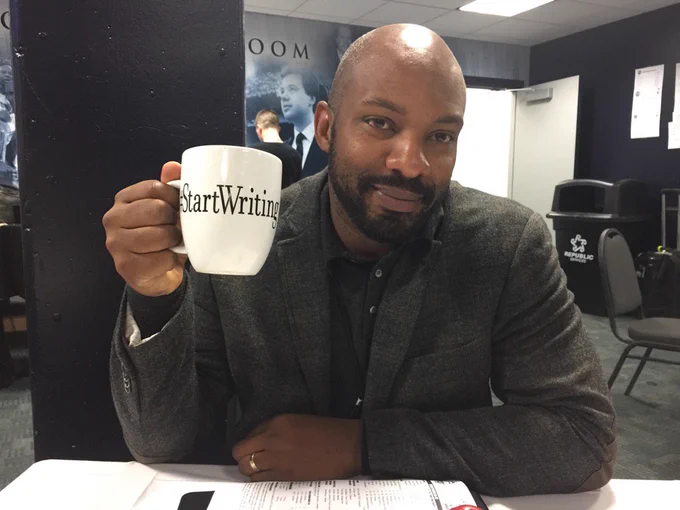 Rod Beard (pictured) has been promoted to sports editor at The Detroit News, joining a handful of Black sports editors at U.S. newspapers.
Rod Beard (pictured) has been promoted to sports editor at The Detroit News, joining a handful of Black sports editors at U.S. newspapers.
“It’s been a long journey — which technically started as a paperboy for The News in the early 1980s,” Beard wrote Thursday on social media.
“I’m truly blessed to get this opportunity and for those who have helped me get here.”
Gary Miles, editor and publisher, and Kevin Hardy, managing editor, said in a note to the staff Thursday, “Rod has done an exemplary job in his 21 years at The News in various positions, most recently as an assistant sports editor. Previously, he covered the Pistons for seven years and the Michigan basketball beat for five years. Prior to that, Rod also worked in our online department, where he produced and edited. He has a bachelor’s degree in communication and English from the University of Michigan. He will report to Managing Editor Kevin Hardy.”
Beard succeeds Daren Tomhave, who “requested to take a step back from the role,” the editors’ note said, adding that “we’re more than pleased that he has agreed to stay on as an assistant sports editor.”
[Sept. 27 update:
[Miles adds:
[“Nicole Cook recently joined The News as Opinion Editor
[“Mark Hicks was recently appointed Breaking News Editor
[“Jakkar Aimery recently moved from web producer to breaking news reporter.
[“Chris Rizk, an Arab American, recently was named Deputy Metro Editor/Nights.
[“We’re happy that the appointments put these outstanding journalists in position to play even more significant roles covering our community. These moves, coupled with our innovative and industry-leading initiative, the Rosa L. Parks Detroit News Internship program, help improve the diversity of our staff and our coverage.
[“Much work remains across the industry to Increase the diversity of newsrooms, but we continue to make it a high priority because more contributions from people with differing backgrounds make for a richer and more complete news report for the people we serve across Michigan each day.
[More about the innovative Parks internship program, which we hope could be replicated in some fashion elsewhere, here].
Separately, “Dozens of New York Times sports staffers and guild members marched through the Times offices Monday afternoon [Sept. 18] to protest the end of the Times’s stand-alone sports desk,” Ben Strauss reported Tuesday for The Washington Post. “They stopped near the main atrium and read the names of some 150 sports staffers past and present, starting with Red Smith, the Pulitzer Prize-winning columnist and sportswriting pioneer at the Times.
“Staffers called the march a vigil for a desk that was a staple of the newspaper’s report for decades. Starting on Tuesday, the Times will rely on the Athletic for the majority of its sports coverage, both in print and online.
“The Times announced in July that it would disband the desk, and it has spent the ensuing weeks relocating around 40 sports staffers to different departments around the newsroom.”
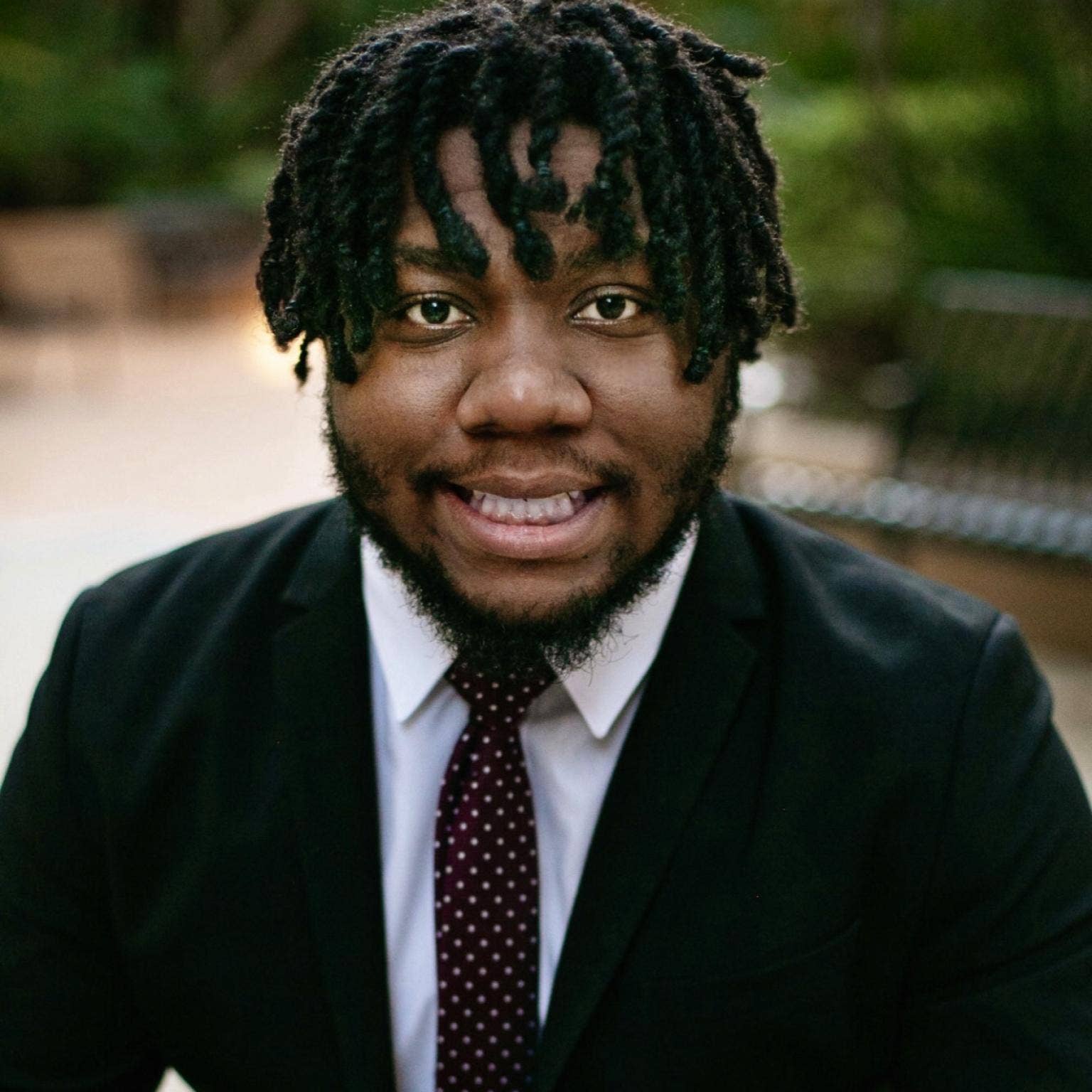 One of the latest is Emmanuel Morgan (pictured), “who on Sports has covered the N.F.L. and combat sports with dogged reporting and a sharp eye,” and now “will focus on pop culture news and the intersection of sports and culture,” the Times announced Sept. 18.
One of the latest is Emmanuel Morgan (pictured), “who on Sports has covered the N.F.L. and combat sports with dogged reporting and a sharp eye,” and now “will focus on pop culture news and the intersection of sports and culture,” the Times announced Sept. 18.

(Credit: Amnesty Eastern Africa)
Congolese Leader Insists He Supports the Media
Heads of state are not asked often enough about how journalists are treated in their countries, but with world leaders gathering at the United Nations last week, reporters had a chance to question President Felix Tshisekedi of the Democratic Republic of Congo on the subject.
Tshisekedi’s country ranks 124 of 180 countries on the Press Freedom Index of Reporters Without Borders.
On Sept. 8, authorities arrested Stanis Bujakera, a journalist in the DRC. “The officers took Bujakera to the local police station, confiscated his two phones and laptop computer, and accused him of ‘spreading false rumors’ and ‘disseminating false information,’ according to those sources,” Amnesty International reported. Bujakera was transferred to prison on Sept. 14.
Other press-freedom groups, such as the Committee to Protect Journalists, Reporters Without Borders and the International Federation of Journalists, echoed Amnesty. So did Congolese journalists and their supporters, who marched, signed petitions and took to social media.
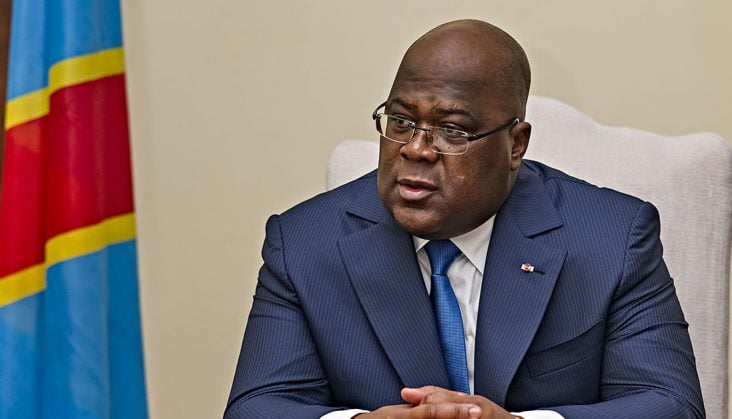 Last Tuesday, Washington Post columnist Joe Davidson and others questioned Tshisekdi (pictured) at a press luncheon at the U.N. staged for the international media.
Last Tuesday, Washington Post columnist Joe Davidson and others questioned Tshisekdi (pictured) at a press luncheon at the U.N. staged for the international media.
“When it comes to press freedom. I’ve always been a great supporter of press freedom through a number of measures,” Tshisekdi replied.
“One, I’ve always been on the side of the media whenever they have a world day for the media. I have always made sure that I’m with the media in the collection. But also, we organized, we had a general review of the media in my own country, which led to the adoption of a law that was much more progressive, a law that was much more progressive than the past 27 years. That law enabled us to bring into the focus new media, which was not there, enabled us to reinforce the freedom of the press and other aspects.
“That’s why when the organization called Reporters sans frontières did its review, in four years, DRC gained 30 seats. It went from 154 out of 180 to 124 right now. So, of course, there have been violence, violations of media in the eastern part of the country. Had it not been for that violation, maybe it would have been in a better place. I’ve always made sure that wherever I am, that the special place is given the relationship with the media, because through reporting violence, reporting from the media, this will enable us to govern our country in a balanced manner.”
Manon Laplace of Africa Report adds more complexity and detail, quoting Tshisekedi as declining to interfere with Bujakera’s case because it is the courts.
In any case, the press-freedom advocates have not been persuaded. The day Tshisekedi spoke at the U.N., Reporters Without Borders announced an “urgent referral of the case to the UN Working Group on Arbitrary Detention.”
- Amnesty Inernational: Democratic Republic of the Congo: Industrial Mining of Cobalt and Copper for Rechargeable Batteries is Leading to Grievous Human Rights Abuses (Sept. 12)
- Karen Juanita Carrillo, New York Amsterdam News: Climate change, conflicts preoccupy U.N. General Assembly
- Cobalt Institute: Cobalt Market Report 2022 [PDF] (May 2023)
- Committee to Protect Journalists: CPJ condemns charging, detention of DRC journalist Stanis Bujakera
- Committee to Protect Journalists: DRC immigration officers attack journalist Soleil Ntumba Mufike to stop eviction coverage (Sept. 6)
- Committee to Protect Journalists: DRC enacts press law and digital code that criminalize journalism (May 23)
- Joe Davidson, Washington Post: U.S. plan envisions factories in Africa for surging EV battery demand
- Andrew L. Gulley, Proceedings of the National Academy of Sciences: China, the Democratic Republic of the Congo, and artisanal cobalt mining from 2000 through 2020 (June 20)
- Shoshana Kedem, African Business: Despite record industry profits, DRC’s cobalt miners fall further into poverty (March 30)
- State Department: Secretary Blinken’s Call with Democratic Republic of the Congo President Tshisekedi (May 24)
Short Takes
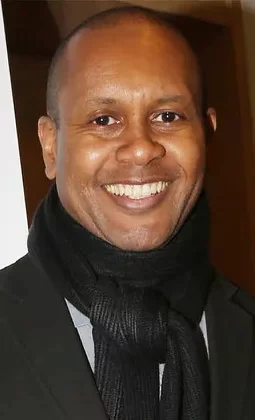 “When Dr. Dre’s landmark album The Chronic appeared all over MTV in 1993 and sold about 6 million units, it was not just the end of the Black Power era in hip-hop, but also the beginning of a Hollywood-like reproduction of the same movie over and over again,” hip-hop lover Kevin Powell (pictured) wrote in a 5,100-word piece for Politico Magazine, commemorating hip-hop’s 50th anniversary. “Today, in 2023, three decades since The Chronic, we’ve gone from fighting the power to recreating and mass-producing the worst aspects of that hugely successful record: endless use of the n-word for Black people; endless use of the b-word for women; a seemingly endless hatred for queer and transgender people; an intense obsession with guns, with violence in all forms, with drug-selling and drug-taking, with money and material things; and anti-anything that even remotely questions the images and words we put forth. . . .”
“When Dr. Dre’s landmark album The Chronic appeared all over MTV in 1993 and sold about 6 million units, it was not just the end of the Black Power era in hip-hop, but also the beginning of a Hollywood-like reproduction of the same movie over and over again,” hip-hop lover Kevin Powell (pictured) wrote in a 5,100-word piece for Politico Magazine, commemorating hip-hop’s 50th anniversary. “Today, in 2023, three decades since The Chronic, we’ve gone from fighting the power to recreating and mass-producing the worst aspects of that hugely successful record: endless use of the n-word for Black people; endless use of the b-word for women; a seemingly endless hatred for queer and transgender people; an intense obsession with guns, with violence in all forms, with drug-selling and drug-taking, with money and material things; and anti-anything that even remotely questions the images and words we put forth. . . .”
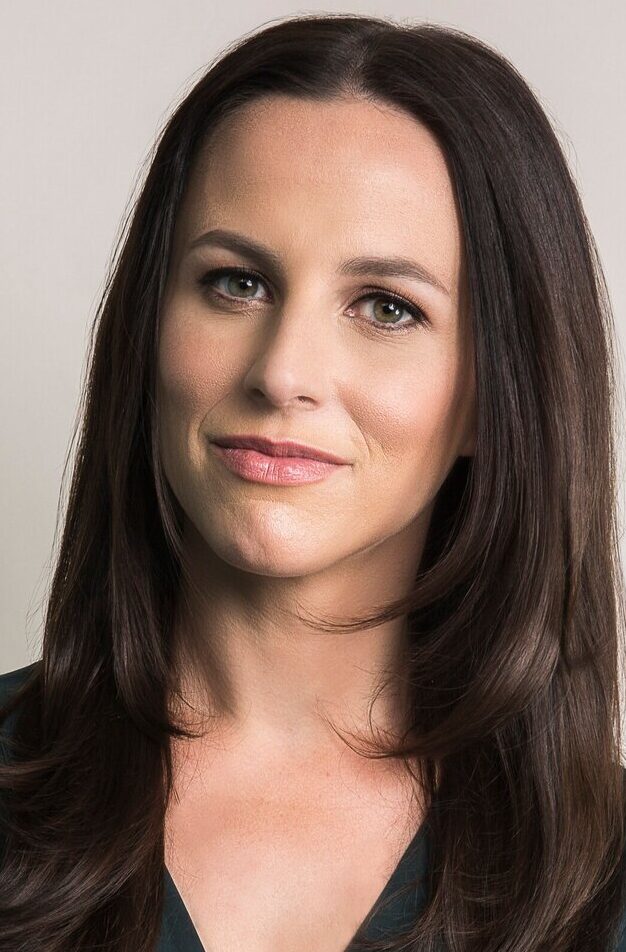 The indictment Friday of Senate Foreign Relations Committee Chairman Bob Menendez, D-N.J., on bribery charges “also could also trouble MSNBC, the cable news network where Alicia Menendez (pictured), the 40-year-old daughter of Bob Menendez, hosts a weekend show called American Voices with Alicia Menendez,” Isaac Schorr wrote Friday for Mediaite. “The most obvious question that comes to mind is ‘Will MSNBC allow Menendez to address the scandal in any way?’ One might be quick to assume the answer is an an easy no, but if CNN’s handling of the Andrew Cuomo sexual misconduct case is any indication, that assumption can’t be taken for granted.” Schorr wrote that MSNBC had not responded when asked.
The indictment Friday of Senate Foreign Relations Committee Chairman Bob Menendez, D-N.J., on bribery charges “also could also trouble MSNBC, the cable news network where Alicia Menendez (pictured), the 40-year-old daughter of Bob Menendez, hosts a weekend show called American Voices with Alicia Menendez,” Isaac Schorr wrote Friday for Mediaite. “The most obvious question that comes to mind is ‘Will MSNBC allow Menendez to address the scandal in any way?’ One might be quick to assume the answer is an an easy no, but if CNN’s handling of the Andrew Cuomo sexual misconduct case is any indication, that assumption can’t be taken for granted.” Schorr wrote that MSNBC had not responded when asked.
- “The new leader of the Atlanta Journal-Constitution wants to increase the publication’s digital subscribers more than eightfold by the end of 2026, an ambitious goal he aims to reach through expanded local-news coverage and new products,” Alexandra Bruell reported Sept. 14 for The Wall Street Journal. ” ‘In the last five-to-10 years, we’ve just focused on Atlanta,’ said Andrew Morse, a former CNN digital executive who took over as the Atlanta Journal-Constitution’s new president and publisher in January. He said the publication plans to hire about 100 people in the coming years and place editorial staff in Georgia cities such as Macon, Savannah, Columbus, Augusta and Athens, where it determined that local coverage has eroded. The publication is also planning to add products dedicated to sports, Black culture, Southern cooking and politics, including new video and audio features — most of which would be available exclusively to subscribers. . . .”
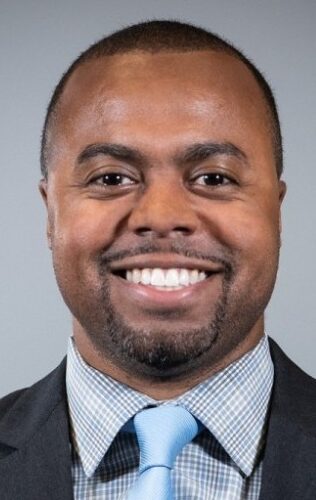 “Adam Orduna (pictured) is the third KCTV5 journalist within the last four months to sue the news station’s parent company Gray Media Group Inc. for allegedly creating a hostile working environment and engaging in discriminatory treatment,” Matti Gellman reported Wednesday for the Kansas City Star. “Orduna, who is Black, alleges he was undermined by a similarly qualified white colleague who was given ‘apparent authority’ over his schedule and work performance. He claimed the station allowed his work and reputation to be unfairly scrutinized by a colleague, whom he alleged to have a prejudice against Black people.” Orduna, a sports reporter, said, “On Jan. 26 he received a termination notice referencing his ‘suitability’ for the role. The lawsuit claims Gray Media Group relied on the statements of his former colleague, who Orduna accused of targeting him, without any human resources investigation into his concerns. . . .”
“Adam Orduna (pictured) is the third KCTV5 journalist within the last four months to sue the news station’s parent company Gray Media Group Inc. for allegedly creating a hostile working environment and engaging in discriminatory treatment,” Matti Gellman reported Wednesday for the Kansas City Star. “Orduna, who is Black, alleges he was undermined by a similarly qualified white colleague who was given ‘apparent authority’ over his schedule and work performance. He claimed the station allowed his work and reputation to be unfairly scrutinized by a colleague, whom he alleged to have a prejudice against Black people.” Orduna, a sports reporter, said, “On Jan. 26 he received a termination notice referencing his ‘suitability’ for the role. The lawsuit claims Gray Media Group relied on the statements of his former colleague, who Orduna accused of targeting him, without any human resources investigation into his concerns. . . .”
- “The United States had 3.5 million residents who identify as Middle Eastern or North African, Venezuelans were the fastest-growing Hispanic group last decade and Chinese and Asian Indians were the two largest Asian groups, according to the U.S. Census Bureau,” Mike Schneider reported Thursday for the Associated Press. “The most detailed race and ethnicity data to date from the 2020 census was released Thursday more than three years after the once-a-decade head count, which determines political power, the distribution of $2.8 trillion in annual federal funding and holds up a mirror to how the U.S. has changed in a decade. . . .”

- “Lil Kim is putting Ebony on blast for the heavily retouched photo the magazine used of her for its limited-edition cover, but the outlet says it is proud of the cover,” Miguel A. Melendez wrote Thursday for ET. “The beef started Tuesday after the magazine unveiled the cover featuring the legendary rapper, which is one of five special covers celebrating 50 years of hip-hop. Ebony shared the cover on its Instagram page and it drew praise from some fans. But a large sector of Lil Kim’s fan base called out the magazine for heavily retouching the photo. Things only got worse from there. . . .”
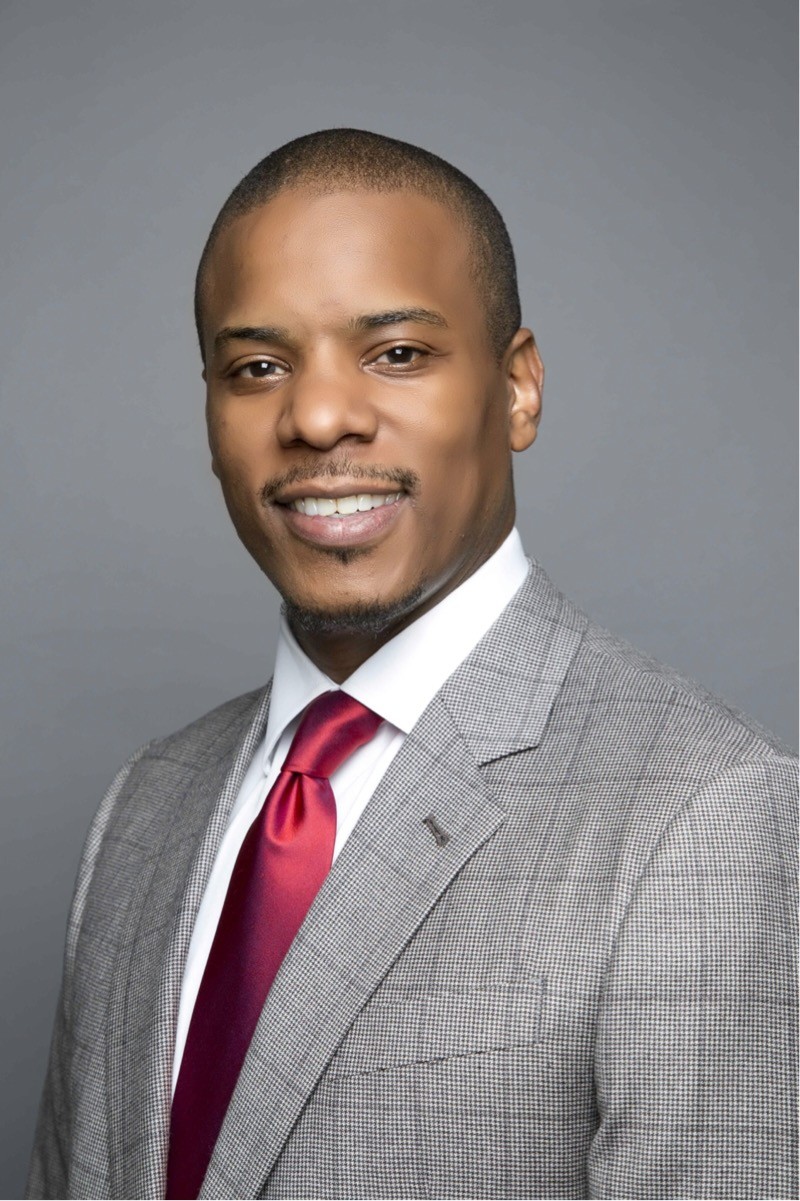 “The political news website The Hill has hired veteran TV news producer Joshua Eure (pictured) as Executive Producer of The Hill video,” A.J. Katz reported Sept. 8 for TV Newser. “Eure has been a senior producer at CBS News and ABC News and executive director of news content and strategy at KXXX-TV in Waco, Texas. More recently, Eure served as the vp of live programming and Washington DC Bureau Chief for Black News Channel. . . .”
“The political news website The Hill has hired veteran TV news producer Joshua Eure (pictured) as Executive Producer of The Hill video,” A.J. Katz reported Sept. 8 for TV Newser. “Eure has been a senior producer at CBS News and ABC News and executive director of news content and strategy at KXXX-TV in Waco, Texas. More recently, Eure served as the vp of live programming and Washington DC Bureau Chief for Black News Channel. . . .”
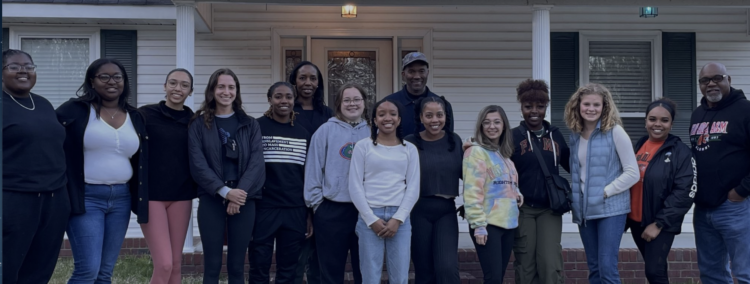
- Earlier this year, seven students from the University of Florida in Gainesville joined four from Florida Agricultural and Mechanical University (FAMU) in Tallahassee for an eight day, 2,800 mile, reporting trip across the U.S. Civil Rights Trail in Alabama, Arkansas, Georgia, Mississippi and Tennessee,” Herbert Lowe, who teaches at UF’s College of Journalism and Communications in Gainesville., wrote Sept. 15 for Nieman Storyboard. “We dubbed ourselves UFxFAMU1963. . . . It was important to me that this trip be framed as a journalism course — one in which everyone in the 15-seat passenger van would strive to tell stories using text, images, audio, video, data and social media to help see and learn from their experiences.” Lowe said he wanted students to “understand the pivotal role that journalists and newspapers — both the white media and the Black Press, for better or worse — played before and during the Civil Rights Movement.”
- “
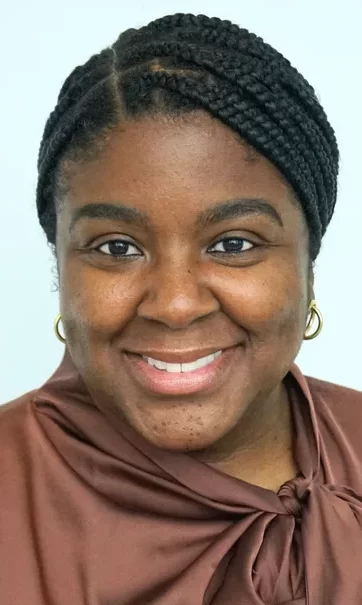 NPR is pleased to announce that Whitney Maddox (pictured) has been promoted to Vice President, Diversity, Equity & Inclusion,” the network said Tuesday. “In her current role, Maddox has led twice-monthly company-wide antiracism workshops (STAR) with more than 1,000 staff members, as well as other leadership and diversity trainings to support more than 250 Member Stations across the country. . . Maddox said, “When I started at NPR, I had the distinct opportunity to lead a two-year focus on improving the work experience of women of color. What happened as a result of that work is one of the reasons this promotion feels like a win for all women of color at NPR. I would not be the leader I am today if it were not for those women embracing me, teaching me and trusting me. . . .”
NPR is pleased to announce that Whitney Maddox (pictured) has been promoted to Vice President, Diversity, Equity & Inclusion,” the network said Tuesday. “In her current role, Maddox has led twice-monthly company-wide antiracism workshops (STAR) with more than 1,000 staff members, as well as other leadership and diversity trainings to support more than 250 Member Stations across the country. . . Maddox said, “When I started at NPR, I had the distinct opportunity to lead a two-year focus on improving the work experience of women of color. What happened as a result of that work is one of the reasons this promotion feels like a win for all women of color at NPR. I would not be the leader I am today if it were not for those women embracing me, teaching me and trusting me. . . .”
- “An upcoming exhibition at Brown University will share valuable insights into the incarcerated life of Mumia Abu-Jamal, a political activist the New York Times once described as ‘the most visible of the 3,000 people awaiting execution on America’s death rows,’ the university announced Sept. 8. “The exhibit of a rare special collection of written papers and other materials will give scholars and members of the public a sense of the sweeping impact the American carceral system has had on millions of lives, including the family and friends of those who have spent time in prisons and jails.” It opens Thursday.
 After “months of conjecture surrounding who would replace Edward Enninful, the 51-year-old outgoing editor of British Vogue, Condé Nast has told the Guardian that London-born journalist Chioma Nnadi (pictured) will take over the role on 9 October,” Morwenna Ferrier reported Sept. 18 for the Guardian. “Once in post, Nnadi, currently editor of the US edition’s website, will be known as head of editorial content, rather than editor-in-chief. She will also become the first Black woman to edit the storied fashion magazine. . . .”
After “months of conjecture surrounding who would replace Edward Enninful, the 51-year-old outgoing editor of British Vogue, Condé Nast has told the Guardian that London-born journalist Chioma Nnadi (pictured) will take over the role on 9 October,” Morwenna Ferrier reported Sept. 18 for the Guardian. “Once in post, Nnadi, currently editor of the US edition’s website, will be known as head of editorial content, rather than editor-in-chief. She will also become the first Black woman to edit the storied fashion magazine. . . .”
- The International Institute of St. Louis has helped refugees and immigrants settle in the St. Louis region for more than 100 years, Gabrielle Hays reported Sept. 18 for the “PBS NewsHour.” “The nonprofit, in partnership with other community organizations, has resettled more than 1,200 Afghan people since 2021. Now it has an Afghan Community Development Program — and monthly newspaper. “These are essential stories. How can I identify with my roots if I don’t know anything? So that’s why that’s what the Afghan Journal serves — it tells the story of St. Louis and its possibilities,” said Moji Sidiqi, the program manager. “It tells the truth about what’s happening in Afghanistan, but it also talks about the power of what it can be.”
- “Newspapers that once delivered news big and small are invaluable windows into our past,” Al Jazeera reports. “They risk being lost forever if not properly preserved and archived. Meenakshi Ravi reports on a project in Nigeria started by journalist Fu’ad Lawal — to rescue old newspapers from dust and decay and digitise decades worth of the country’s front pages in a freely accessible online archive. . . .”
- “People often laugh when Fathi Mohamed Ahmed tells them she runs the first and only all-female newsroom in Somalia, one of the most dangerous places on the planet to be a reporter,” Abdi Sheikh reported for Reuters. “But Bilan, the media house where Ahmed works as chief editor, is far from a punchline, producing a daily mix of hard news and in-depth features for local and sometimes international audiences. In its almost 18 months of operation Bilan, which means ‘to shine a light’, has overcome prejudice and insecurity to illuminate some of the most taboo subjects in Somalia, including a female drug epidemic, albinism, women living with HIV and period [or menstruation] shame. . . .”
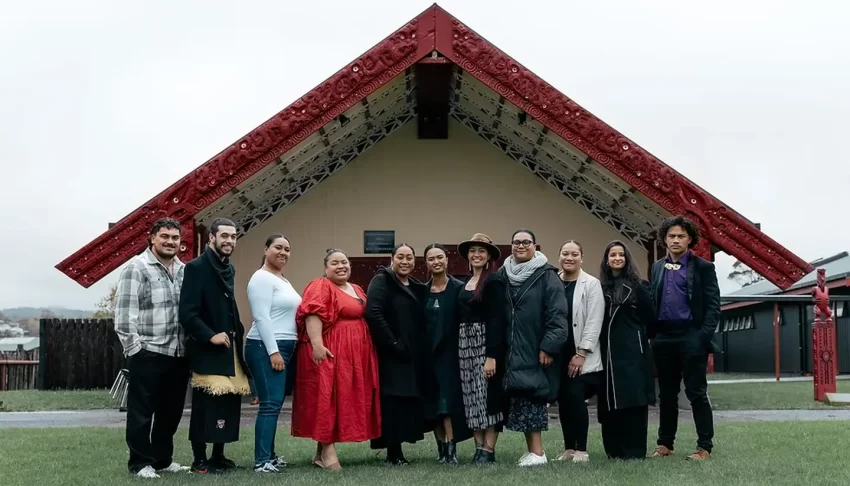
- “One of the world’s leading brands and tech giants — Google — is backing indigenous journalism and ensuring there is more diversity in the newsroom,” Vaimoana Mase reported Thursday for the New Zealand Herald. “The global brand featured as a key partner in an indigenous workshop and camp for 24 people made up of budding reporters and journalists from around the Pacific region, including Australia. . . .The majority of this year’s cohort is made up of Pasifika students from Samoan, Tongan and Fijian heritage. There are also cadets of Māori and Indian descent. . . .”
- “Since it was launched in 2008, Afrique Média, a Cameroon-based television channel, has grown significantly – reaching millions of people on their TV screens, as well as boasting over 800,000 subscribers on YouTube and 360,000 followers on Facebook,” Gretel Kahn reported Tuesday for Reuters. “It is one of the most influential francophone news sources in the region and is also one of the most embedded with Kremlin propaganda. ‘The content of Afrique Média is the philosophy of Moscow,’ says Isaac Antwi-Boasiako, a PhD Candidate and an Assistant Lecturer at the School of Media at Technological University Dublin. ‘Afrique Média follows Putin’s philosophy of promoting Russia’s agenda in Africa.’ . . . .”
- “The head of Hong Kong’s leading journalists group was sentenced on Monday to five days jail for obstructing police officers in September last year after a case seen by some critics as a further blow to media freedoms in the financial hub,” Jessie Pang reported for Reuters. “Ronson Chan, chairman of the Hong Kong Journalists Association, was detained and handcuffed by two plainclothes officers while covering a story after he failed to hand over his personal identity card. Chan, who pleaded not guilty, earlier told the court that he had asked the police to show their warrant cards before handing over his document, which all Hong Kong residents must carry. . . .”
To subscribe at no cost, please send an email to journal-isms+subscribe@groups.io and say who you are.
Facebook users: “Like” “Richard Prince’s Journal-isms” on Facebook.
Follow Richard Prince on Twitter @princeeditor
Richard Prince’s Journal-isms originates from Washington. It began in print before most of us knew what the internet was, and it would like to be referred to as a “column.” Any views expressed in the column are those of the person or organization quoted and not those of any other entity. Send tips, comments and concerns to Richard Prince at journal-isms+owner@
View previous columns (after Feb. 13, 2016).
View previous columns (before Feb. 13, 2016)
- Diversity’s Greatest Hits, 2018 (Jan. 4, 2019)
- Book Notes: Is Taking a Knee Really All That? (Dec. 20, 2018)
- Book Notes: Challenging ’45’ and Proudly Telling the Story (Dec. 18, 2018)
- Book Notes: Get Down With the Legends! (Dec. 11, 2018)
- Journalist Richard Prince w/Joe Madison (Sirius XM, April 18, 2018) (podcast)
- Richard Prince (journalist) (Wikipedia entry)
- February 2018 Podcast: Richard “Dick” Prince on the need for newsroom diversity (Gabriel Greschler, Student Press Law Center, Feb. 26, 2018)
- Diversity’s Greatest Hits, 2017 — Where Will They Take Us in the Year Ahead?
- Book Notes: Best Sellers, Uncovered Treasures, Overlooked History (Dec. 19, 2017)
- An advocate for diversity in the media is still pressing for representation, (Courtland Milloy, Washington Post, Nov. 28, 2017)
- Morgan Global Journalism Review: Journal-isms Journeys On (Aug. 31, 2017)
- Diversity’s Greatest Hits, 2016
- Book Notes: 16 Writers Dish About ‘Chelle,’ the First Lady
- Book Notes: From Coretta to Barack, and in Search of the Godfather
- Journal-isms’ Richard Prince Wants Your Ideas (FishbowlDC, Feb. 26, 2016)
- “JOURNAL-ISMS” IS LATEST TO BEAR BRUNT OF INDUSTRY’S ECONOMIC WOES (Feb. 19, 2016)
- Richard Prince with Charlayne Hunter-Gault, “PBS NewsHour,” “What stagnant diversity means for America’s newsrooms” (Dec. 15, 2015)
- Book Notes: Journalists Follow Their Passions
- Book Notes: Journalists Who Rocked Their World
- Book Notes: Hands Up! Read This!
- Book Notes: New Cosby Bio Looks Like a Best-Seller
- Journo-diversity advocate turns attention to Ezra Klein project (Erik Wemple, Washington Post, March 5, 2014)

